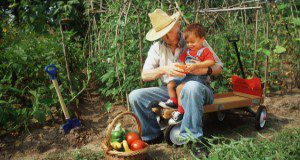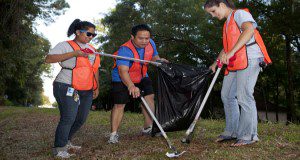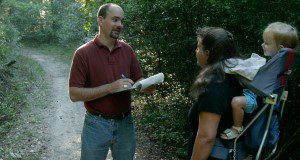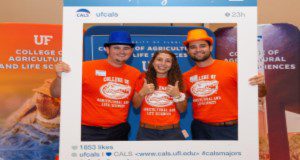Regardless of workspace or class setting, group work has gotten a reputation for being less than pleasant. However, when individuals have the opportunity to prepare for group work via understanding their personal strengths, expectations, and perspectives, the not-so-popular group work can often turn into pleasant, productive, and collaborative engagement. Because group dynamics shift and vary from group to group, there is a constant learning opportunity to understand how to work in groups successfully. This new 2-page publication of the UF/IFAS Department of Agricultural Education and Communication will identify simple yet effective strategies that can serve as foundational building blocks whenever preparing oneself or others for group work. Written by Cecilia E. Suarez and Jarred A. Shellhouse.
https://edis.ifas.ufl.edu/wc389
Tag: Department of Agricultural Education and Communication
The Road to Recovery #5: Self-Assessment of Virtual Facilitation to Build Trust
This fifth publication in the Road to Recovery series discusses how Extension professionals can evaluate techniques to build trust when facilitating virtual programming. Specific recommendations are provided addressing concerns about short- and long-term virtual trust, inclusion techniques, Zoom fatigue, and cybersecurity. This new 5-page publication of the UF/IFAS Department of Agricultural Education and Communication was written by Colby Silvert, Cody Gusto, John Diaz, and Glenn Israel.
https://edis.ifas.ufl.edu/wc388
The Road to Recovery #4: Evaluating Virtual Techniques to Reach Clientele and Promote Equity
This fourth publication in the Road to Recovery series explores the challenges Extension professionals may encounter in reaching clientele virtually during a pandemic. This new 4-page publication of the UF/IFAS Department of Agricultural Education and Communication discusses the concept of digital equity and provides recommendations to evaluate efforts to access and connect with key audiences. Written by Colby Silvert, Cody Gusto, John Diaz, and Glenn Israel.
https://edis.ifas.ufl.edu/wc387
The Road to Recovery #6: Evaluating Virtual Strategies to Build Community Capacity and Resilience
This sixth publication in the Road to Recovery series provides tips and strategies for Extension professionals interested in evaluating efforts to promote community capacity building and community resilience using virtual platforms. This new 5-page publication of the UF/IFAS Department of Agricultural Education and Communication was written by Cody Gusto, Colby Silvert, John Diaz, and Glenn Israel.
https://edis.ifas.ufl.edu/wc385
Conducting the Needs Assessment #3: Educator Motivations, Barriers, and Objections
This third publication in the Conducting the Needs Assessment series outlines a range of motivations, barriers, and common objections Extension educators and other service providers may have pertaining to needs assessments. It is not an easy task to conduct a needs assessment, yet there are many motives for implementing one. This new 4-page publication of the Department of Agricultural Education and Communication discusses strategies for increasing educator motivation and removing barriers and objections to conducting a needs assessment. Written by Matt Benge.
https://edis.ifas.ufl.edu/wc386
Leading Difficult Conversations Series #3: Creating a Safe Conversation Environment
This publication series is intended for leaders who bear the responsibility of having difficult conversations as part of their professional responsibilities. Earlier in this publication series, the foundational principles of preparing for difficult conversations were established: (1) defining the issue and (2) determining your motive for the conversation. Once those principles are put into practice, the next phase of having a difficult conversation is creating a safe environment for the conversation. Components of creating a safe environment include recognizing a conversation’s content and conditions, understanding the threats to a safe environment, and utilizing skills to overcome threats to restore safety. This new 3-page publication of the UF/IFAS Department of Agricultural Education and Communication was written by Christy Chiarelli.
https://edis.ifas.ufl.edu/wc384
An Introduction to Utilizing Community Leaders to Expand Resiliency Efforts Following a Disaster
In the southeastern United States, many agricultural, vulnerable, and rural communities (AVRCs) must cope with natural disasters regularly. These natural disasters not only harm communities, crops, and livelihoods, but also can negatively impact the mental health of affected individuals, including those living in AVRCs. The purposes of this new 3-page article are to (1) provide tips on identifying specific individuals who could qualify as community leaders and (2) provide details on how partnering with community leaders can be beneficial for mental health communication and outreach. Written by Lisa Lundy, Jacqueline Aenlle, Ricky Telg, Tracy Irani, Angie Lindsey, Ashley Mcleod-Morin, Michaela Kandzer, and Phillip Stokes, and published by the UF/IFAS Department of Agricultural Education and Communication.
https://edis.ifas.ufl.edu/wc383
Fundamentals of Volunteer Orientation
This new 4-page fact sheet is intended to assist volunteer managers when creating volunteer orientations for their new volunteers. Volunteer training and orientation is a critical component which should promote volunteers’ understanding of the role they hold within organizations. Leaders of volunteer organizations must ensure their organizations have adequately prepared volunteers to carry out the organization’s mission. Last, volunteer leaders should incorporate the cause, system, and social orientation components to effectively create an orientation focused on providing the appropriate onboarding of their most valuable asset: volunteers. Written by Olivia Caillouet, Jessica Williams, Shelby Atwood, and Matt Benge, and published by the UF/IFAS Department of Agricultural Education and Communication.
https://edis.ifas.ufl.edu/wc382
Foundations of Effective Classroom Management
Classroom management can be challenging for teachers. While managing a classroom requires flexible approach, there are some basic strategies than can be used to make the classroom safe and engaging. This new 3-page article provides recommendations to teachers to manage student behavior in the agriculture classroom. Written by Kelsey M. Thornton, R. G. (Tre) Easterly III, and Ed Osborne, and published by the UF/IFAS Department of Agricultural Education and Communication.
https://edis.ifas.ufl.edu/wc381
The Savvy Survey #6e: Understanding How Question Type Impacts Future Analysis
This publication will briefly look at how the intent of a survey affects which types of questions should be asked and how the data can be analyzed to help address this intent. It is intended to provide guidance to Extension professionals, as well as persons in community organizations, who conduct surveys for program planning, improvement, and evaluation. Written by Colleen E. Gariton and Glenn D. Israel, and published by the UF/IFAS Department of Agricultural Education and Communication.
https://edis.ifas.ufl.edu/pd083
Leading Difficult Conversations Series #2: Preparing for the Conversation
This publication series is designed to equip leaders with strategies and tactics to use when they are tasked with having a difficult conversation. When approaching difficult conversations, leaders are encouraged to examine themselves prior to engaging in a hard conversation, because ultimately, a person can only change themself. In this series, the first topic to explore is preparing for the conversation. The components of proper preparation include clearly defining the issue and considering the motive behind the conversation. This new 3-page publication of the Department of Agricultural Education and Communication was written by Christy Chiarelli.
https://edis.ifas.ufl.edu/wc378
The Road to Recovery #3: Facilitating Community Resilience for Effective Pandemic Response
This third publication in the Road to Recovery series provides information and recommendations to support Extension professionals’ ability to facilitate capacity building and resilience development for communities during COVID-19 and potential future pandemic situations. This new 5-page publication of the UF/IFAS Department of Agricultural Education and Communication was written by Cody Gusto, Colby Silvert, and John Diaz.
https://edis.ifas.ufl.edu/wc380
The Road to Recovery #1: Introduction
This first publication in the Road to Recovery series provides a brief introduction to some core concerns and considerations for Extension professionals as they adapt their outreach, education, and evaluation efforts during a pandemic and recovery. This new 3-page publication of the UF/IFAS Department of Agricultural Education and Communication also includes an overview of the subsequent articles in the Road to Recovery series. Written by Cody Gusto, Colby Silvert, and John Diaz.
https://edis.ifas.ufl.edu/wc379
Developing Extension Programming to Help Low-Income Families Save Money and Energy: The Community Weatherization Coalition Model
This new 3-page publication of the Department of Agricultural Education and Communication is the first in a series that will help Extension agents, nonprofits, agency personnel, and other promoters of community development better understand both the issue of high utility bills among low-income residents and what they can do to help. This first publication provides an overview of one program approach taken by a group of volunteers in Alachua County, the Community Weatherization Coalition, which uses a model of trained “energy coaches.” Written by Paul Monaghan, Sarah Blucher, Marianne Schmink, Alane Humrich, Jennison Kipp, and Wendell Porter.
https://edis.ifas.ufl.edu/wc368
Exemplary Youth Leadership Series: Encourage the Heart
This publication series is designed to outline strategies and experiences to expose youth to and engage them with leadership concepts. In this publication, students will try on aspects of the final practice of exemplary leaders: encouraging the heart. Two quick, low-cost activities are included for implementation with youth and adults working with youth. These activities are best suited for students ages 10–18. However, modifications are included for each of the activities to allow for different group sizes, ages, and abilities of the youth participating. This new 2-page publication of the UF/IFAS Department of Agricultural Education and Communication was written by Megan Stein.
https://edis.ifas.ufl.edu/wc377
The Road to Recovery: Building Physical and Emotional Trust when Engaging with Extension Clientele
Now is a crucial time for Extension professionals to engage with clientele. In both urban and rural communities, clients are facing a multitude of unprecedented challenges related to COVID-19. Many Extension professionals already have experience in emergency and disaster preparedness, response, and recovery that can be applied in the present context. However, we must rethink how we interact with and assist clientele to ensure their safety and our own. To do this, it is critical we understand that the pandemic has exacerbated emotional trauma and anxiety resulting in trust gaps. This new 4-page publication of the UF/IFAS Department of Agricultural Education and Communication aims to build Extension professionals’ sensitivity to the needs and emotional strains that COVID-19 presents for clients, and the strategies needed for effective recovery. Written by Colby Silvert, Cody Gusto, and John Diaz.
https://edis.ifas.ufl.edu/wc376
Using Social Media to Engage Communities with Research: SMART Social Media: Planning for Success
This new 6-page publication of the Department of Agricultural Education and Communication focuses on developing social media plans. The intended audience is individuals (e.g., scientists wishing to share their research), organizations, or people who work on grant-funded research projects. In this article, we provide evidence-based strategies for designing, developing, and implementing social media plans to share science research with others inside and outside of the professional scientific community. While the design, development, and implementation of social media may vary, we provide general strategies that are applicable across contexts. Written by Lisa Lundgren, Kathryn A. Stofer, Kirsten Hecht, and Tyus D. Williams.
https://edis.ifas.ufl.edu/wc362
Using Social Media to Engage Communities with Research: Basics
This new 7-page publication of the Department of Agricultural Education and Communication defines social media, presents reasons for using it to share science, and identifies multiple platforms available for use now. We provide an introduction to and overview for a series on getting the most out of social media for sharing science or STEM, including agricultural research. Our primary goal is to assist people working through social media to broaden the community engaged with research. The series includes additional publications on social media planning, evaluating social media engagement, and social media for branding, among other topics. Written by Kathryn A. Stofer, Lisa Lundgren, Kirsten Hecht, and Tyus D. Williams.
https://edis.ifas.ufl.edu/wc361
Understanding Extension for School-Based Agricultural Education #1: Extension 101
This article and series were designed primarily for use by secondary agriscience teachers in school-based agricultural education programs (SBAE) to help build a strong understanding of Extension and the role of Extension professionals. An important part of access and use of Extension services is understanding its background, structure, and function. This initial publication in the Understanding Extension for School-Based Agricultural Education series provides agricultural educators and the general public with a basic understanding of Extension. This new 4-page publication of the Department of Agricultural Education and Communication was written by Debra Barry, John Diaz, Alyssa Shepherd, Jennifer Patton, and Stephen Gran.
https://edis.ifas.ufl.edu/wc372
Leading Difficult Conversations Series #1: Introduction
This publication series examines strategies and tactics for leaders to utilize when tasked with having a difficult conversation. Leadership can require leaders to have necessary conversations that are not always easy. Through providing leaders with specific tools to have difficult conversations, this series aims to promote dialogue and equip individuals to be more successful leaders. The series provides information regarding preparing for difficult conversations, creating a safe conversation environment, utilizing conversation tactics, and employing listening skills. This new 2-page publication of the UF/IFAS Department of Agricultural Education and Communication is part 1 of the series. Written by Christy Chiarelli.
https://edis.ifas.ufl.edu/wc374













